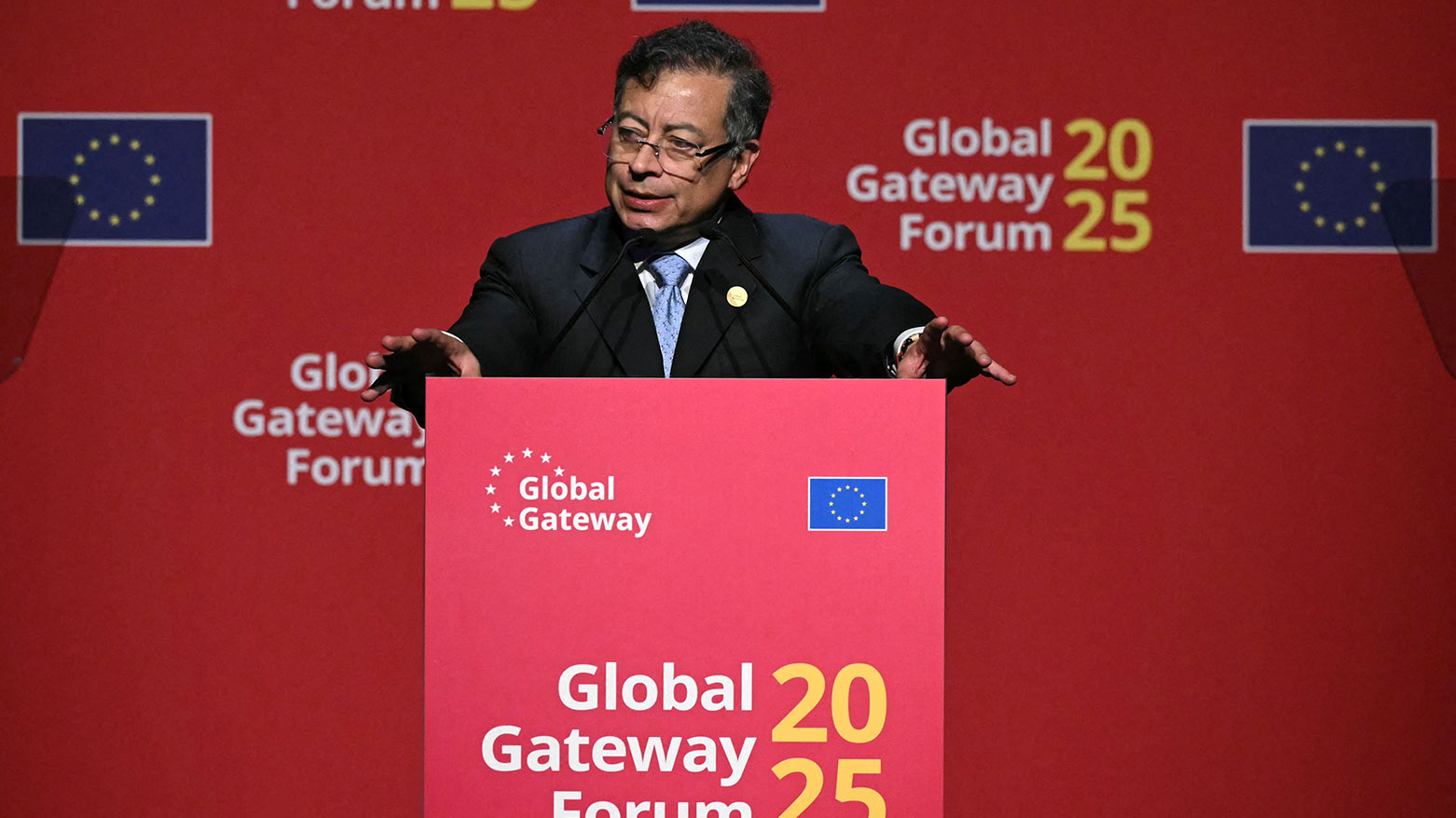Colombian President Gustavo Petro Voices Support for an Independent Kurdistan
Colombian President Gustavo Petro expressed full support for an independent Kurdistan during an interview with Kurdistan24, drawing parallels between Kurdish and Palestinian struggles for statehood.

ERBIL (Kurdistan24) - During an interview with Kurdistan24’s Europe correspondent Barzan Hassan, conducted with the Colombian President Gustavo Petro on the sidelines of his meeting with the Colombian diaspora in Brussels, he expressed his full support for the establishment of an independent State of Kurdistan, drawing parallels between the Kurdish struggle for nationhood and the Palestinian quest for liberation.
Speaking candidly in Spanish, President Petro said: “I have always believed that the long-standing struggle for the liberation of Palestine and the struggle for the Kurds to be a nation run parallel, and they are among the most democratic forces that can be found in the Middle East.”)
The Colombian President continued, reflecting on the historic Kurdish fight against extremism:
“I have personally witnessed the Kurdish struggle against the black flag of extremism. The Kurds defended democracy and freed parts of the Middle East from tyranny. Unfortunately, many countries in the region and the wider world have not given the Kurds the support they deserve.”
He highlighted how the Kurdish resistance in Kobani played a pivotal role in countering the spread of extremist ideologies during one of the darkest periods in the Middle East.
Petro further added: (“Your struggle, among others, helped to liberate the Middle East, but the Middle East, just like the West, has not helped the creation of a Kurdish nation.”)
At the conclusion of the interview, President Petro asked Kurdistan24 to convey his personal greetings and message of solidarity to the Kurdish people:
“I would say that moving forward, the existence of a Palestinian nation and state must go hand in hand with the existence of a Kurdish nation and state. Please send my greetings to your people. Thank you very much.”)
Kurdistan Region: A Democratic Model of Pluralism and Development
The Kurdistan Region Government (KRG), under the leadership of Prime Minister Masrour Barzani, stands today as one of the most advanced Region in the Middle East. The region’s political framework is founded upon inclusivity, democratic governance, and peaceful coexistence among its diverse communities — Kurds, Turkmen, Assyrians, Chaldeans, Yazidis, Kakayis, and Christians.
Historically, in March 11, 1970 an Agreement was reached between the Iraqi government and the Kurdish leadership recognizing the Kurds’ right to autonomy for the first time. However, following Baghdad’s violation of the accord and the infamous 1975 Algiers Agreement, Kurdish hopes were betrayed. The people of Kurdistan faced genocidal campaigns, including the Anfal operations (1987–1989), which resulted in the systematic destruction of over 4,500 villages, the disappearance of 8,000 Barzanis, and the killing of more than 5,000 civilians in Halabja through chemical attacks.
Despite these atrocities, the Kurdish struggle endured. The Gulan Revolution of 1976, followed by the 1988 Kurdish Front Unity and the March 1991 Uprising, paved the way for the establishment of today’s Kurdistan Regional Government (KRG).
Since the formation of its first parliament in 1991, the Kurdistan Region has become a model of stability and federal democracy within Iraq. The Ninth Cabinet, under Prime Minister Masrour Barzani, has led an ambitious development strategy across key sectors including infrastructure, energy, water security, digital transformation, agriculture, and exports.
Under the supervision of the Department of Media and Information, the government implemented 717 road projects totaling 2,681 kilometers, with investments exceeding 1 trillion and 29 billion dinars. Strategic projects included the Erbil–Duhok highway, Khlaifan–Spilk road, Pirman tunnel, and Great Zab Bridge, among others.
The Runaki Project aims to deliver 24-hour electricity by the end of 2026, already benefiting 4 million citizens and allowing the shutdown of over 2,000 private generators.
To strengthen water security, the KRG constructed major dams such as Jmorka, Khana Sard, Dwana, Aqoban, Shukir, Turj, Komsban, and Bastura, in addition to 126 water basins that bolster irrigation and rural access. The Erbil Emergency Water Project, costing $480 million, is expected to resolve 70% of the capital’s water shortages.
Through the “My Account” Project, the KRG has digitized salary payments for 900,000 citizens, enhancing transparency and integrating modern banking systems. Parallelly, the government established a robust e-governance framework, featuring a centralized financial system, e-education platforms, border management systems, and the official. KRD domain—reflecting the Region’s growing global digital identity.
The Ninth Cabinet has advanced food security by building grain silos in Qushtapa, Kalar, Halabja, and Derash Barda–Rovia, each with 40,000-ton capacity. Over 30,000 greenhouses were created, benefiting 3,813 farmers, while 11 potato factories and 7 processing plants now sustain local industry. Kurdish agricultural exports — including pomegranate, rice, honey, tahini, apples, and mushrooms — have expanded to Europe, Canada, and the UAE, growing export ratios from 1.8% to 10%.
The Kurdistan Region encompasses the governorates of Erbil, Sulaimani, Halabja, and Duhok. The region spans 78,736 square kilometers, comprising over 18% of Iraq’s territory.
The capital of the Kurdistan Region is Erbil, one of the world’s oldest continuously inhabited cities and the administrative, cultural, and political center of Southern Kurdistan.
In his remarks to Kurdistan24, President Gustavo Petro’s recognition of the Kurdish cause marked a historic statement of solidarity from Latin America toward the Kurdish people. His call for simultaneous recognition of Palestinian and Kurdish statehood underscores the global resonance of the Kurdish struggle for freedom and democracy.
The Kurdistan Region, with its history of resilience, inclusive governance, and modern development, continues to stand as a regional model of peace and progress — a living example of the very democratic ideals that President Petro lauded.